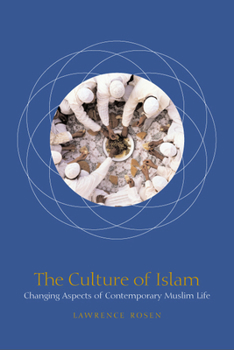The Culture of Islam: Changing Aspects of Contemporary Muslim Life
Select Format
Select Condition 
Book Overview
Having worked for several decades in North Africa, anthropologist Lawrence Rosen is uniquely placed to ask what factors contribute to the continuity and changes characterizing the present-day Muslim world. In The Culture of Islam , he brings his erudition and his experiences to illuminating key aspects of Muslim life and how central tenets of that life are being challenged and culturally refashioned. Through a series of poignant tales--from the struggle by a group of friends against daily corruption to the contest over a saint's identity, from nostalgia for the departed Jews to Salman Rushdie's vision of doubt in a world of religious certainty--Rosen shows how a dazzling array of potential changes are occurring alongside deeply embedded continuity, a process he compares to a game of chess in which infinite variations of moves can be achieved while fundamental aspects of "the game" have had a remarkably enduring quality. Whether it is the potential fabrication of new forms of Islam by migrants to Europe (creating a new "Euro-Islam," as Rosen calls it), the emphasis put on individuals rather than institutions, or the heartrending problems Muslims may face when their marriages cross national boundaries, each story and each interpretation offers a window into a world of contending concepts and challenged coherence. The Culture of Islam is both an antidote to simplified versions of Islam circulating today and a consistent story of the continuities that account for much of ordinary Muslim life. It offers, in its human stories and its insights, its own contribution, as the author says, "to the mutual understanding and forgiveness that alone will make true peace possible."
Format:Hardcover
Language:English
ISBN:0226726134
ISBN13:9780226726137
Release Date:January 2003
Publisher:University of Chicago Press
Length:246 Pages
Weight:1.16 lbs.
Dimensions:1.0" x 6.3" x 9.3"
Customer Reviews
1 rating
An interesting, well-informed view
Published by Thriftbooks.com User , 15 years ago
Lawrence Rosen is one of the most thoughtful anthropological voices writing about the Middle East. In "The Culture of Islam" he attempts something which is almost impossible: concisely describe and write about a dogmatically and culturally diverse religion with a depth of understanding that permeates how religion is actually lived. I was sympathetic to much of what he wrote, which comes mainly from Arab examples (and even there from an exceptional case, Morocco), although I did not necessarily agree with all of his conclusions. He is well-versed in Islamic jurisprudence and Arab social organization, and this primer goes farther than most in conveying a palpable understanding of a fascinating system of thought, meaning-making and cosmology. Because his experience is mainly in Morocco, as mentioned before many of the examples come from there. That does not detract from his main points which most definitely have resonance across the entire region.






